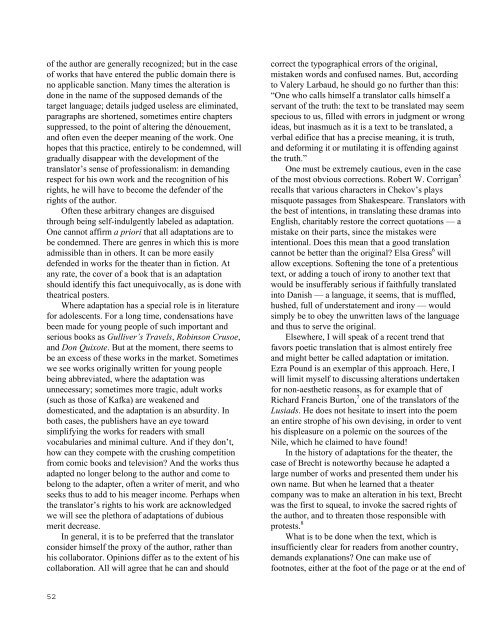their - The University of Texas at Dallas
their - The University of Texas at Dallas
their - The University of Texas at Dallas
Create successful ePaper yourself
Turn your PDF publications into a flip-book with our unique Google optimized e-Paper software.
<strong>of</strong> the author are generally recognized; but in the case<br />
<strong>of</strong> works th<strong>at</strong> have entered the public domain there is<br />
no applicable sanction. Many times the alter<strong>at</strong>ion is<br />
done in the name <strong>of</strong> the supposed demands <strong>of</strong> the<br />
target language; details judged useless are elimin<strong>at</strong>ed,<br />
paragraphs are shortened, sometimes entire chapters<br />
suppressed, to the point <strong>of</strong> altering the dénouement,<br />
and <strong>of</strong>ten even the deeper meaning <strong>of</strong> the work. One<br />
hopes th<strong>at</strong> this practice, entirely to be condemned, will<br />
gradually disappear with the development <strong>of</strong> the<br />
transl<strong>at</strong>or’s sense <strong>of</strong> pr<strong>of</strong>essionalism: in demanding<br />
respect for his own work and the recognition <strong>of</strong> his<br />
rights, he will have to become the defender <strong>of</strong> the<br />
rights <strong>of</strong> the author.<br />
Often these arbitrary changes are disguised<br />
through being self-indulgently labeled as adapt<strong>at</strong>ion.<br />
One cannot affirm a priori th<strong>at</strong> all adapt<strong>at</strong>ions are to<br />
be condemned. <strong>The</strong>re are genres in which this is more<br />
admissible than in others. It can be more easily<br />
defended in works for the the<strong>at</strong>er than in fiction. At<br />
any r<strong>at</strong>e, the cover <strong>of</strong> a book th<strong>at</strong> is an adapt<strong>at</strong>ion<br />
should identify this fact unequivocally, as is done with<br />
the<strong>at</strong>rical posters.<br />
Where adapt<strong>at</strong>ion has a special role is in liter<strong>at</strong>ure<br />
for adolescents. For a long time, condens<strong>at</strong>ions have<br />
been made for young people <strong>of</strong> such important and<br />
serious books as Gulliver’s Travels, Robinson Crusoe,<br />
and Don Quixote. But <strong>at</strong> the moment, there seems to<br />
be an excess <strong>of</strong> these works in the market. Sometimes<br />
we see works originally written for young people<br />
being abbrevi<strong>at</strong>ed, where the adapt<strong>at</strong>ion was<br />
unnecessary; sometimes more tragic, adult works<br />
(such as those <strong>of</strong> Kafka) are weakened and<br />
domestic<strong>at</strong>ed, and the adapt<strong>at</strong>ion is an absurdity. In<br />
both cases, the publishers have an eye toward<br />
simplifying the works for readers with small<br />
vocabularies and minimal culture. And if they don’t,<br />
how can they compete with the crushing competition<br />
from comic books and television And the works thus<br />
adapted no longer belong to the author and come to<br />
belong to the adapter, <strong>of</strong>ten a writer <strong>of</strong> merit, and who<br />
seeks thus to add to his meager income. Perhaps when<br />
the transl<strong>at</strong>or’s rights to his work are acknowledged<br />
we will see the plethora <strong>of</strong> adapt<strong>at</strong>ions <strong>of</strong> dubious<br />
merit decrease.<br />
In general, it is to be preferred th<strong>at</strong> the transl<strong>at</strong>or<br />
consider himself the proxy <strong>of</strong> the author, r<strong>at</strong>her than<br />
his collabor<strong>at</strong>or. Opinions differ as to the extent <strong>of</strong> his<br />
collabor<strong>at</strong>ion. All will agree th<strong>at</strong> he can and should<br />
correct the typographical errors <strong>of</strong> the original,<br />
mistaken words and confused names. But, according<br />
to Valery Larbaud, he should go no further than this:<br />
“One who calls himself a transl<strong>at</strong>or calls himself a<br />
servant <strong>of</strong> the truth: the text to be transl<strong>at</strong>ed may seem<br />
specious to us, filled with errors in judgment or wrong<br />
ideas, but inasmuch as it is a text to be transl<strong>at</strong>ed, a<br />
verbal edifice th<strong>at</strong> has a precise meaning, it is truth,<br />
and deforming it or mutil<strong>at</strong>ing it is <strong>of</strong>fending against<br />
the truth.”<br />
One must be extremely cautious, even in the case<br />
<strong>of</strong> the most obvious corrections. Robert W. Corrigan 5<br />
recalls th<strong>at</strong> various characters in Chekov’s plays<br />
misquote passages from Shakespeare. Transl<strong>at</strong>ors with<br />
the best <strong>of</strong> intentions, in transl<strong>at</strong>ing these dramas into<br />
English, charitably restore the correct quot<strong>at</strong>ions — a<br />
mistake on <strong>their</strong> parts, since the mistakes were<br />
intentional. Does this mean th<strong>at</strong> a good transl<strong>at</strong>ion<br />
cannot be better than the original Elsa Gress 6 will<br />
allow exceptions. S<strong>of</strong>tening the tone <strong>of</strong> a pretentious<br />
text, or adding a touch <strong>of</strong> irony to another text th<strong>at</strong><br />
would be insufferably serious if faithfully transl<strong>at</strong>ed<br />
into Danish — a language, it seems, th<strong>at</strong> is muffled,<br />
hushed, full <strong>of</strong> underst<strong>at</strong>ement and irony — would<br />
simply be to obey the unwritten laws <strong>of</strong> the language<br />
and thus to serve the original.<br />
Elsewhere, I will speak <strong>of</strong> a recent trend th<strong>at</strong><br />
favors poetic transl<strong>at</strong>ion th<strong>at</strong> is almost entirely free<br />
and might better be called adapt<strong>at</strong>ion or imit<strong>at</strong>ion.<br />
Ezra Pound is an exemplar <strong>of</strong> this approach. Here, I<br />
will limit myself to discussing alter<strong>at</strong>ions undertaken<br />
for non-aesthetic reasons, as for example th<strong>at</strong> <strong>of</strong><br />
Richard Francis Burton, 7 one <strong>of</strong> the transl<strong>at</strong>ors <strong>of</strong> the<br />
Lusiads. He does not hesit<strong>at</strong>e to insert into the poem<br />
an entire strophe <strong>of</strong> his own devising, in order to vent<br />
his displeasure on a polemic on the sources <strong>of</strong> the<br />
Nile, which he claimed to have found!<br />
In the history <strong>of</strong> adapt<strong>at</strong>ions for the the<strong>at</strong>er, the<br />
case <strong>of</strong> Brecht is noteworthy because he adapted a<br />
large number <strong>of</strong> works and presented them under his<br />
own name. But when he learned th<strong>at</strong> a the<strong>at</strong>er<br />
company was to make an alter<strong>at</strong>ion in his text, Brecht<br />
was the first to squeal, to invoke the sacred rights <strong>of</strong><br />
the author, and to thre<strong>at</strong>en those responsible with<br />
protests. 8<br />
Wh<strong>at</strong> is to be done when the text, which is<br />
insufficiently clear for readers from another country,<br />
demands explan<strong>at</strong>ions One can make use <strong>of</strong><br />
footnotes, either <strong>at</strong> the foot <strong>of</strong> the page or <strong>at</strong> the end <strong>of</strong><br />
52

















